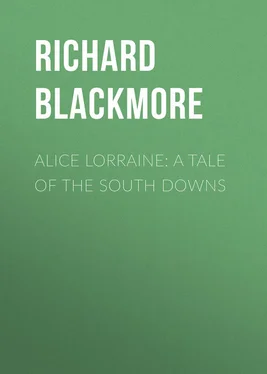Richard Blackmore - Alice Lorraine - A Tale of the South Downs
Здесь есть возможность читать онлайн «Richard Blackmore - Alice Lorraine - A Tale of the South Downs» — ознакомительный отрывок электронной книги совершенно бесплатно, а после прочтения отрывка купить полную версию. В некоторых случаях можно слушать аудио, скачать через торрент в формате fb2 и присутствует краткое содержание. Жанр: foreign_prose, на английском языке. Описание произведения, (предисловие) а так же отзывы посетителей доступны на портале библиотеки ЛибКат.
- Название:Alice Lorraine: A Tale of the South Downs
- Автор:
- Жанр:
- Год:неизвестен
- ISBN:нет данных
- Рейтинг книги:4 / 5. Голосов: 1
-
Избранное:Добавить в избранное
- Отзывы:
-
Ваша оценка:
- 80
- 1
- 2
- 3
- 4
- 5
Alice Lorraine: A Tale of the South Downs: краткое содержание, описание и аннотация
Предлагаем к чтению аннотацию, описание, краткое содержание или предисловие (зависит от того, что написал сам автор книги «Alice Lorraine: A Tale of the South Downs»). Если вы не нашли необходимую информацию о книге — напишите в комментариях, мы постараемся отыскать её.
Alice Lorraine: A Tale of the South Downs — читать онлайн ознакомительный отрывок
Ниже представлен текст книги, разбитый по страницам. Система сохранения места последней прочитанной страницы, позволяет с удобством читать онлайн бесплатно книгу «Alice Lorraine: A Tale of the South Downs», без необходимости каждый раз заново искать на чём Вы остановились. Поставьте закладку, и сможете в любой момент перейти на страницу, на которой закончили чтение.
Интервал:
Закладка:
“Now, Lovejoy, I can put up with much; but not with maddening questions.”
“You mean, I suppose, that you could enjoy half-a-dozen cool red cherries, if you had the chance to pick them in among the long green leaves?”
“Half-a-dozen! Half-a-peck; and half-a-bushel afterwards. Where have I put my hat? I am off, if it costs my surviving sixpence.”
“Lorraine, all the coaches are gone for the day. But you are always in such a hurry. You ought to think a little, perhaps, before you make up your mind to come. Remember that my father’s house is a good house, and as comfortable as any you could wish to see; still it may be different from what you are accustomed to.”
“Such things are not worth thinking about. Custom, and all that, are quite below contempt; and we are beginning to treat it so. The greatest mistake of our lives is custom; and the greatest delight is to kick it away. Will your father be glad to see me?”
“He has heard me talk of you, many a time; and he would have been glad to come to London (though he hates it so abominably), to see you and to ask you down, if he thought that you would require it. It is a very old-fashioned place; you must please to bear that in mind. Also, my father, and my mother, and all of us, are old-fashioned people, living in a quiet way. You would carry on more in an hour, than we do in a twelvemonth. We like to go all over things, ever so many times, perhaps (like pushing rings up and down a stick), before we begin to settle them. But when we have settled them, we never start again; as you seem to do.”
“Now, Gregory, Gregory, this is bad. When did you know me to start again? Ready I am to start this once, and to dwell in the orchards for ever.”
In a few words more, these two young fellows agreed to take their luck of it. There was nothing in chambers for Lovejoy to lose, by going away for a day or two; and Hilary long had felt uneasy at leaving a holiday overdue. Therefore they made their minds up promptly for an early start next morning, ere the drowsy town should begin to kick up its chimney-pots, like a sluggard’s toes.
“Gregory,” said Lorraine, at last, “your mind is a garden of genius. We two will sit upon bushel-baskets, and watch the sun rise out of sacks. Before he sets, we will challenge him to face our early waggon. Covent Garden is our trysting spot, and the hour 4 a.m. Oh, day to be marked with white chalk for ever!”
“I am sure I can’t tell how that may be,” answered the less fervent Gregory. “There is no chalk in our grounds at all; and I never saw black chalk anywhere. But can I trust you to be there? If you don’t come, I shall not go without you; and the whole affair must be put off.”
“No fear, Gregory; no fear of me. The lark shall still be on her nest; – but wait, my friend, I will tell the Counsellor, lest I seem to dread his face.”
Lovejoy saw that this was the bounden duty of a gentleman, inasmuch as the learned lawyer had promised his young friend a little remonstrance upon the following morning. The chances were that he would forget it: and this, of course, enhanced the duty of making him remember it. Therefore Hilary gave three taps on the worm-eaten door of his good tutor, according to the scale of precedence. This rule was – inferior clerk, one tap; head-clerk, two taps; pupil (being no clerk at all, and paying, not drawing, salary), as many taps as he might think proper, in a reasonable way.
Hilary, of course, began, as he always managed to begin, with almost everybody.
“I am sorry to disturb you, sir; and I have nothing particular to say.”
“In that case, why did you come, Lorraine? It is your usual state of mind.”
“Well, sir,” said Hilary, laughing at the terse mood of the master, “I thought you had something to say to me – a very unusual state of mind,” he was going to say, “on your part;” but stopped, with a well-bred youth’s perception of the unbecoming.
“Yes, I have something to say to you. I remember it now, quite clearly. You were playing some childish game with Lovejoy, in the pupil’s room. Now, this is all well enough for you, who are fit for nothing else, perhaps. Your father expects no work from you; and if he did, he would never get it. You may do very well, in your careless way, being born to the gift of indifference. But those who can and must work hard – is it honest of you to entice them? You think that I speak severely. Perhaps I do, because I feel that I am speaking to a gentleman.”
“It is uncommonly hard,” said Hilary, with his bright blue eyes half conscious of a shameful spring of moisture, “that a fellow always gets it worse for trying to be a gentleman.”
“You have touched a great truth,” Mr. Malahide answered, labouring heavily not to smile; “but so it always must be. My boy, I am sorry to vex you; but to be vexed is better than to grieve. You like young Lovejoy – don’t make him idle.”
“Sir, I will dart at him henceforth, whenever I see him lazy; instead of the late Lord Chancellor, now sitting upon asphodel.”
“Lorraine,” the great lawyer suddenly asked, in a flush of unusual interest, “you have been at Oxford quite recently. They do all sorts of things there now. Have they settled what asphodel is?”
“No, sir, I fear that they never will. There are several other moot questions still. But with your kind leave, I mean to try to settle that point to-morrow.”
CHAPTER XII.
WITH THE COSTERMONGERS
Martin Lovejoy, Gregory’s father, owned and worked a pleasant farm in that part of Kent which the natives love to call the “Garden of Eden.” In the valley of the upper Medway, a few miles above Maidstone, pretty hamlets follow the soft winding of the river. Here an ancient race of settlers, quiet and intelligent, chose their home, and chose it well, and love it as dearly as ever.
To argue with such people is to fall below their mercy. They stand at their cottage-doors, serenely as thirty generations of them have stood. A riotous storm or two may have swept them; but it never lasted long. The bowers of hop and of honeysuckle, trimmed alleys, and rambling roses, the flowering trees by the side of the road, and the truest of true green meadows, the wealth of deep orchards retiring away – as all wealth does – to enjoy itself; and where the land condescends to wheat, the vast gratitude of the wheat-crop, – nobody wonders, after a while, that these men know their value.
The early sun was up and slurring light upon London housetops, as a task of duty only, having lost all interest in a thing even he can make no hand of. But the brisk air of the morning, after such a night of sweltering, and of strong smells under slates, rode in the perpetual balance of the clime, and spread itself. Fresh, cool draughts of new-born day, as vague as the smile of an infant, roved about; yet were to be caught according to the dew-lines. And of these the best and truest followed into Covent Garden, under the force of attraction towards the green stuff they had dwelt among.
Here was a wondrous reek of men before the night had spent itself. Such a Babel, of a market-morning in “the berry-season,” as makes one long to understand the mother-tongue of nobody. Many things are nice and handsome; fruit and flowers are fair and fresh; life is as swift as life can be; and the pulse of price throbs everywhere. Yet, upon the whole, it is wiser not to say much more of it.
Martin Lovejoy scarcely ever ventured into this stormy world. In summer and autumn he was obliged to send some of his fruit to London; but he always sent it under the care of a trusty old retainer, Master John Shorne, whose crusty temper and crisp wit were a puzzle to the Cockney costermonger. Throughout the market, this man was known familiarly as “Kentish Crust,” and the name helped him well in his business.
Читать дальшеИнтервал:
Закладка:
Похожие книги на «Alice Lorraine: A Tale of the South Downs»
Представляем Вашему вниманию похожие книги на «Alice Lorraine: A Tale of the South Downs» списком для выбора. Мы отобрали схожую по названию и смыслу литературу в надежде предоставить читателям больше вариантов отыскать новые, интересные, ещё непрочитанные произведения.
Обсуждение, отзывы о книге «Alice Lorraine: A Tale of the South Downs» и просто собственные мнения читателей. Оставьте ваши комментарии, напишите, что Вы думаете о произведении, его смысле или главных героях. Укажите что конкретно понравилось, а что нет, и почему Вы так считаете.












